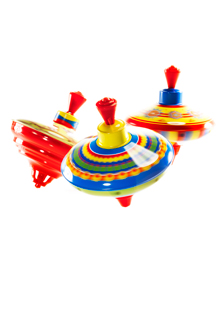
Photo: Jeff Harris Studio
Millions of people suffer debilitating dizzy spells. But there's help—and it starts with getting the right diagnosis.
One August day in 1994, Linda Borne's world began spinning—and barely paused for the next year and a half. "I was bringing my daughter home from swim practice, and my 14-month-old son was in the car, too," says Borne, now 48, who lives with her family in Canton, Georgia. "I pulled into the driveway just as I had a thousand times before—a normal turn, not fast. Suddenly, everything around me was moving, as if I were on a merry-go-round." Borne managed to get her car into the garage—"I don't know how I did it"—and asked her daughter to help get the toddler inside. Then she spent most of the next 18 months in bed, nauseated and, at times, vomiting, as her husband, relatives, and friends pitched in to keep the household running. "I saw seven doctors," she says. "One suggested cutting the vestibular nerve on the left side of my head, which controls balance. But that didn't seem like a good idea."
Finally, Borne made an appointment at the renowned Shea Ear Clinic in Memphis. Her vertigo was diagnosed as Ménière's disease—a fluid imbalance in the inner ear. A steroid injection eased the pressure in her ear, and doctors prescribed a low-salt diet to help reduce fluid retention. "I got my life back, 100 percent," she says. "When you're dizzy, you look normal on the outside, but on the inside you're just trying to get through every moment of every day. It isn't really living."
Episodes of vertigo—whether it's a mild sensation that the room is spinning or an attack so intense you feel as if you're on a Tilt-A-Whirl—are responsible for 3.2 million visits to doctors' offices and emergency rooms each year. "Dizziness is very limiting. Sometimes you can't drive, you can't predict what's going to happen to you," says ear, nose, and throat specialist Anil Lalwani, MD, chairman of the department of otolaryngology at New York University Medical Center. "It can destroy your life—but it doesn't have to."
Once dismissed as a sign of mental imbalance, dizziness is now being taken seriously: In the past few years, dozens of specialized centers for dizziness and balance disorders have opened across the United States, and a number of surprisingly simple and often noninvasive procedures can resolve most cases. The trick is getting a correct diagnosis.
"Dizziness can be caused by more than two dozen medical conditions," says Douglas E. Mattox, MD, chairman of the department of otolaryngology at Emory University School of Medicine in Atlanta, "and there are no tests for the major ones, so a patient's description is very important."
The top causes of dizziness and the best ways to find relief
Crystals called otoliths—"ear rocks"—normally attached to balance-sensing cells in the inner ear get dislodged.
Symptoms: Episodes that last a few seconds, occur only in certain positions, and don't affect hearing.
The fix: The Epley maneuver. Your doctor will cradle your head as you quickly lie back. She'll turn your head to one side, wait 30 seconds, then turn it further, which repositions the otoliths. It's effective 80 percent of the time with one treatment, nearly 100 percent of the time when repeated. (You can learn a home version.)
An imbalance of fluid in the inner ear.
Symptoms: Sudden attacks of vertigo that can lead to severe nausea and sweating. Often they are preceded by a feeling of pressure in one or both ears, a loss of hearing, or the perception of odd noises. Episodes can last two to four hours.
The fix: Limiting sodium to 1,500 milligrams a day to ease fluid retention and avoiding caffeine, alcohol, and tobacco help 80 to 90 percent of patients. Diuretic drugs can also ease fluid pressure, as can the handheld Meniett device, which delivers pulses that disperse fluid. Steroid or antibiotic injections can help stubborn cases.
Up to 42 percent of migraine sufferers experience vertigo. The spells can occur before or during an attack, or even without head pain.
Symptoms: Dizziness lasting just a few minutes or for a day or more (which is why doctors may not realize migraines are the source of the trouble). One sign that seems unique to migraine vertigo is heightened sensitivity to sound during the episode.
The fix: Eliminating possible migraine trigger foods (such as chocolate, sourdough bread, aged cheese, dried fruit, smoked fish); taking antimigraine medications.
This is inflammation of the vestibular nerve—the balance nerve—caused by a viral infection. Researchers suspect the culprit is a member of the herpes family.
Symptoms: Vertigo that can last for days; intense nausea and vomiting.
The fix: Drugs that stop dizziness by suppressing signals from the vestibular system, such as Ativan (lorazepam) and Valium (diazepam), as well as antinausea drugs like Antivert (meclizine). Acyclovir, which helps suppress herpes outbreaks, may also help.
More health remedies: Treatments for four common problems
As a reminder, always consult your doctor for medical advice and treatment before starting any program.




